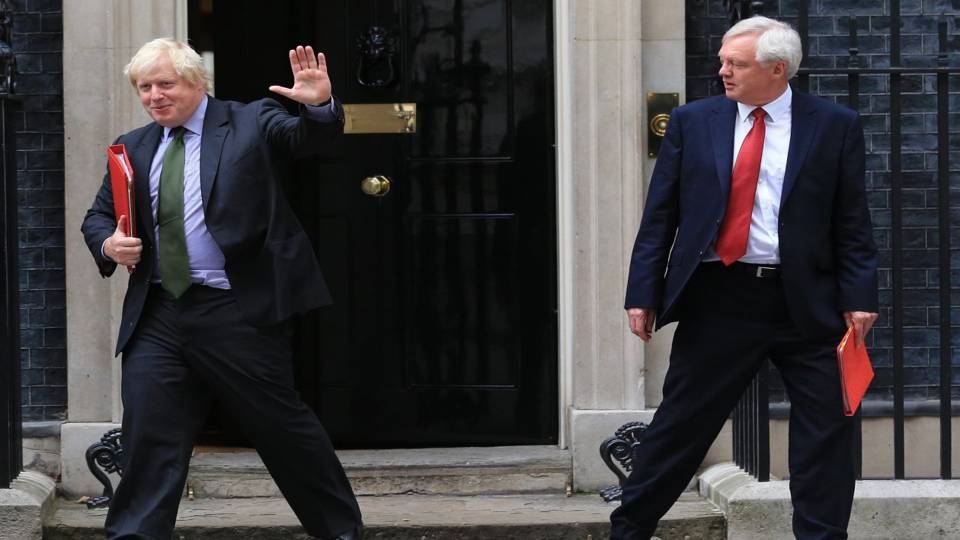Boris Johnson Quits as U.K. Foreign Secretary Amid Brexit Turmoil
Exit comes in wake of David Davis’s resignation as minister in charge of Britain’s negotiations to leave the EU
U.K. Prime Minister Theresa May was battling Monday to overcome her biggest crisis since she lost her parliamentary majority in last year’s general election after Foreign Secretary Boris Johnson became the second prominent supporter of Britain’s departure from the European Union to quit her government in less than 24 hours.
Mr. Johnson’s resignation, announced by Downing Street in a brief statement, followed that of David Davis, the minister in charge of Britain’s negotiations to leave the EU.
Mr. Johnson is a longtime figurehead for the fervently anti-EU wing of the ruling Conservative Party and his departure increases the chance that Mrs. May could face a formal challenge to her leadership.
Downing Street didn’t elaborate on the reasons for Mr. Johnson’s resignation but it is likely that, like Mr. Davis, he quit in protest at the terms of a new Brexit plan agreed by the cabinet on Friday. Mr. Johnson didn’t immediately comment.
The British pound fell 0.2% to $1.3256 and 0.3% against the euro after Mr. Johnson’s resignation, having earlier traded higher after news of Mr. Davis’s exit.
The resignations of Mr. Johnson and Mr. Davis increase the chances of a leadership challenge to Mrs. May from lawmakers in her Conservative Party unhappy with her plan to keep the U.K. economy closely tied to the EU after Brexit. Steve Baker, a Brexit supporter who was serving as a junior minister in Mr. Davis’s department, also quit.
Forty-eight Conservative members of Parliament must back a call for a vote of confidence in Mrs. May for one to take place among party lawmakers.
There are at least that many pro-Brexit lawmakers among the 316 Conservatives in the House of Commons to make that happen.
Mr. Davis told the British Broadcasting Corp. on Monday that he wouldn’t stand in a leadership challenge and wouldn’t encourage others to do so. “I think it is the wrong thing to do,” he said.
Mr. Johnson, though, has long been seen by lawmakers as harboring leadership ambitions. He had been expected to enter the contest to lead the Conservative Party after David Cameron resigned in June 2016 having failed to secure a referendum vote to stay in the EU. But with just hours to go before nominations closed, Mr. Johnson ruled himself out. That surprise decision followed a declaration from then ally Michael Gove that he would seek the party’s leadership, having concluded that Mr. Johnson wasn’t up to the job. The contest was won by Mrs. May, who offered Mr. Johnson one of the top jobs in her government as she sought to unify a divided party.
Still, Mujtaba Rahman of the Eurasia consulting group said Mrs. May could still come out on top if challenged.
There are two big factors working in Mrs. May’s favor.
The first is that there are now less than nine months before the U.K. is scheduled to leave the EU—and a leadership contest would further weaken London’s hand in the critical negotiations to come with the EU. The second is that many Conservative lawmakers are terrified that a leadership contest could set in train events that would lead to another general election—and a victory for the main opposition Labour Party’s left-wing leader, Jeremy Corbyn.
If a leadership challenge was mounted and failed, it would leave pro-Brexit lawmakers severely weakened and less able to influence events.
Mrs. May’s chances of survival appear to be enhanced by the support for her Brexit plan from Mr. Gove, the environment secretary and another prominent Brexit backer. On Sunday, he defended the plan, saying it will give the U.K. full control over immigration and the freedom to diverge from EU rules on goods and services.
“What we have done is make a balanced decision,” he told the BBC, adding that hard-line Brexit supporters pushing for a more decisive break “shouldn’t make the perfect the enemy of the good.”
Earlier Monday officials in Brussels said they didn’t expect to see a significant shift following Mr. Davis’s resignation.
An EU official said Mr. Davis had held roughly four hours of “face-to-face time” with Michel Barnier, the EU’s chief Brexit negotiator, this year. They met in London in February, in March just before the EU summit, and a couple of weeks ago, the official said.
Much of the day-to-day negotiations have been handled by Oliver Robbins, a senior civil servant who works out of Mrs. May’s office.
Mrs. May moved quickly Monday to replace Mr. Davis, announcing that 44-year-old housing minister Dominic Raab would take his place.
Mr. Raab was appointed housing minister in January, a high-profile post following a fire at Grenfell Tower in London that left dozens dead. A lawyer, diplomat and Conservative Party adviser before being elected to Parliament in 2010, he was previously a junior minister in the justice department. He campaigned in favor of leaving the EU in the U.K.’s 2016 referendum on membership.






















